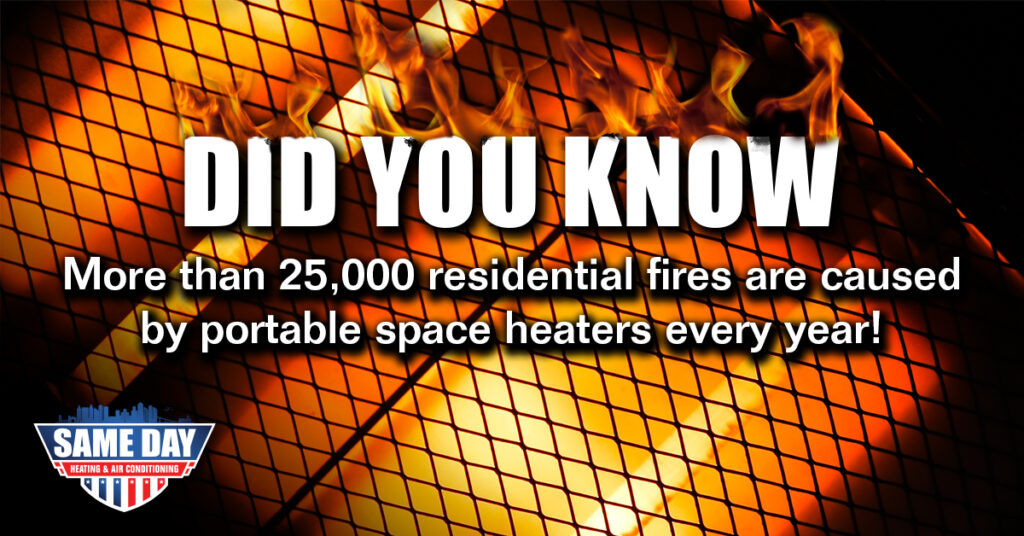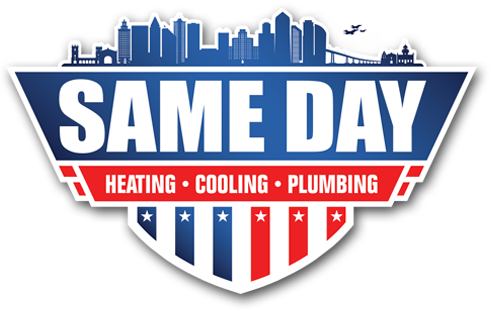Space Heater Safety: Things To Know
Winter might look a little different from what we’re used to this year, so whether that’s spending more time at home or changing plans, keeping your space comfortable makes all the difference in an enjoyable season.
Especially if you live in an older home or apartment building, keeping a consistent heat throughout can come with challenges. If you’re struggling to get certain areas of your home to keep up with other rooms for example, you may be considering a space heater as a quick solution. And while they are quick, it’s important to realize that in most cases space heaters are a temporary fix and relying on them often indicates larger problems with your furnace or HVAC system.
Types of Space Heaters or Portable Heaters
If you need to heat a space independently of, or as a supplement to, your HVAC system, the most common residential space heaters can typically be found in one of three categories:
Radiant or Infrared heaters
These types of heaters produce radiant, or infrared heat, almost instantly without heating the materials and housing around them. This makes them a great choice for homes with pets or children, as there’s less risk of burns from accidental contact. They tend to be very quiet, however they can be a little more expensive than their ceramic counterparts
Ceramic space heaters
Generally the most common space heater, ceramic heaters use convection heat to circulate air around an element that heats up inside the unit. These can be quite compact, light, and very easy to move around. They can heat up a space relatively quickly, especially if you’ve done your homework and purchased the right size heater for the space you’re looking to heat.
Because ceramic heaters are so popular, many models are available affordably, but that can also mean they aren’t built for longevity. A common complaint is that they don’t last more than one or two seasons.
Oil heaters
Oil filled heaters are more comparable to small, portable radiators. Like radiators, they’re filled with oil and use that to radiate heat from the radiator coils out into the room. These take a while to heat a space once they’ve been turned on, so planning ahead is key. They tend to be quiet as they don’t rely on fans, and they can continue to produce heat sometimes as long as an hour after they’ve been turned off.

Space Heater Safety Issues
More than 25,000 residential fires are caused by portable space heaters every year, so it’s little wonder one of the most common questions we hear is: are space heaters safe?
The answer depends on a few factors. For example, the type of space heater you choose impacts its safety, as well as how you operate it within the space. For maximum space heater safety, follow these guidelines:
Energy Source
Because space heaters use so much electricity to operate, the dangers of electrical fires are high almost no matter what type of heater you choose. That’s why it’s important to check what kind of space your heater is rated for, and make sure you’re not trying to heat a space that is either too large or too small. It’s also why you should never plug a space heater into a power strip or extension cord — instead, plug them directly into the wall outlet and preferably a GFCI outlet if you have one. Additionally, don’t plug anything else into the same outlet as the space heater — this increases the chances of overloading the circuit.
Placement
Where you put your space heater has an important impact on how safely you’ll be able to add heating to a space. Space heaters need at least a 3 feet buffer, preferably more if you can get it, around them — away from drapes, bedding, carpet, anything that might be flammable. They also need a solid foundation, like the floor or a low, sturdy table.
Also keep in mind what might be in the environment you’re heating — for example if you need to warm up a shop or garage, make sure there aren’t any paint cans, gas cans, or fertilizers in the space, as just the fumes from these products can be combustible.
Monitoring
And finally — never leave your space heater running unattended. This includes when you leave the room for any length of time, or if you’re heating a bedroom and you might fall asleep. Many space heaters include timers for this specific reason, but it’s still best to shut them off if you plan on leaving the space or falling asleep.
Space heaters can be a smart choice for supplemental heating, but if you’re relying on it to prop up your existing heating system, chances are there are definitely more efficient — and safe — ways to get your home comfortable in the winter months, and keep it that way. Curious if your furnace is running the way it should be? You can run through the most common furnace and heating problems on our site to see if it’s something you might be able to troubleshoot on your own. If you can’t find the answers, or you know you need to supplement or improve your primary heating system, we’re here to help offer expert advice for your situation and space. Call our professionals at (619) 762-30144 today. Fore more information on space heater safety, visit the resource page on energy.gov.
